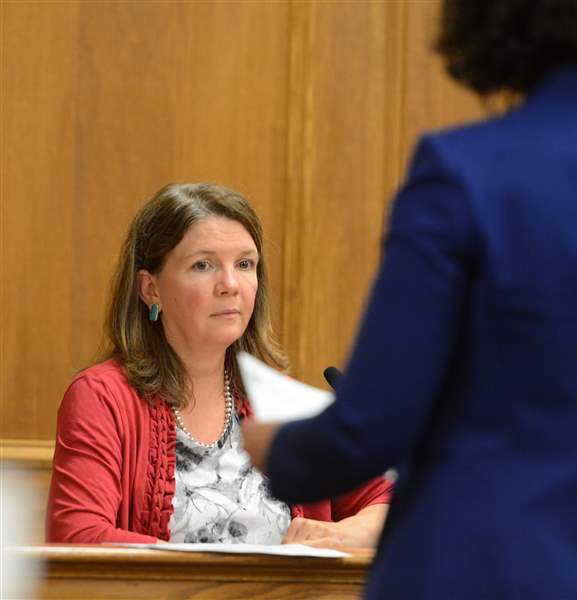
Denver city clerk says she will issue marriage licenses to gay couples despite Colorado ban
7/10/2014
Boulder County Clerk and Recorder Hillary Hall testifies in court at the Boulder County Justice Center on Wednesday, July 9, 2014 in Boulder, Colo. Hall is in court to respond to a suit brought by Colorado Attorney General John Suthers who wants the court to issue an injunction to stop the county from issuing marriage licenses to same-sex couples. (AP Photo/Daily Camera, Cliff Grassmick)
ASSOCIATED PRESS
DENVER — Denver’s clerk said Thursday she will join her counterpart in Boulder in issuing marriage licenses to gay couples after a judge said the liberal college town’s clerk could keep doing so in defiance of Colorado’s gay-marriage ban.
District Court Judge Andrew Hartman ruled earlier in the day that Boulder County Clerk Hillary Hall can ignore a federal stay on a ruling from the 10th U.S. Circuit Court of Appeals in Denver, which found states cannot set gender requirements for marriage.
The judge said gay marriage is still technically illegal in Colorado but that Hall’s behavior was not harming anyone. But he said all who receive a license should be warned that the licenses could still be invalid if a court later finds that Hall didn’t have the authority to issue them.
Hartman also noted that every judge who has considered a gay marriage ban in the past year — including one in Colorado the previous afternoon — has found it unconstitutional. He said Colorado’s prohibition is “hanging on by a thread.”
Denver Clerk and Recorder Debra Johnson announced her decision to start issuing licenses to gay couples shortly after Hartman issued his ruling.
Hall has issued more than 100 same-sex marriage licenses since the 10th Circuit ruling on June 25. Republican state Attorney General John Suthers sued Hall, the only clerk in Colorado who defied the federal stay.
Hall argued that despite the stay, Colorado’s gay-marriage ban violates the U.S. Constitution.
Suthers said Hall’s behavior was causing “legal chaos” while the issue works its way through the courts.
Nancy Leong, a University of Denver law professor, said Hartman’s ruling effectively allows government officials to sometimes disobey state law if they believe it violates the nation’s founding principles. “I read his opinion to say a certain level of what we may call civil disobedience is permissible under the U.S. Constitution,” Leong said.
She said that, in the abstract, it seemed unlikely a judge would permit a government official to do something contrary to state law. But things play out differently in the notoriously liberal Colorado city known as “The Berkeley of the Rockies.”
“It’s Boulder,” Leong added.
Democratic Gov. John Hickenlooper appointed Hartman to the bench last year. A spokesman for the governor did not immediately respond to a request for comment Thursday.
The decision from a three-judge 10th Circuit panel found states cannot deprive people of the fundamental right to marry simply because they choose partners of the same sex.
The ruling is now law in the six states covered by the court: Colorado, Kansas, New Mexico, Oklahoma, Utah and Wyoming. However, the panel immediately put its decision on hold pending an appeal.
On Wednesday, the office of the Utah attorney general announced it will challenge the panel’s ruling directly to the U.S. Supreme Court, meaning the nation’s highest court will have at least one same-sex marriage case on its plate when it returns in October.
In Colorado, District Judge C. Scott Crabtree on Wednesday became the 16th judge to strike down a state’s gay marriage ban in the past year, but he also put his ruling on hold pending an appeal.
Crabtree wrote that the provisions in Colorado law clearly violate the state and U.S. constitutions. “There is no rational relationship between any legitimate governmental purpose and the marriage bans,” he wrote.
The ruling will be appealed by Attorney General John Suthers’ office, which defended the ban.